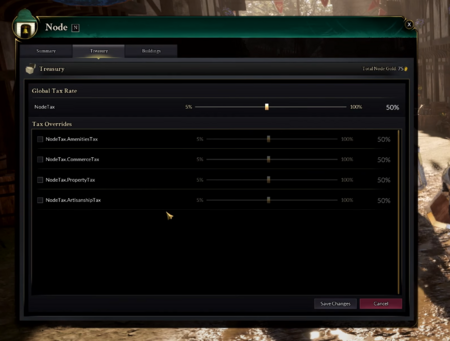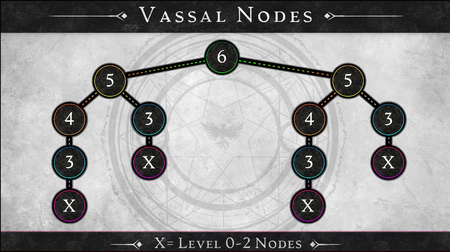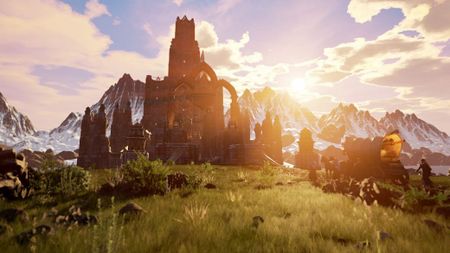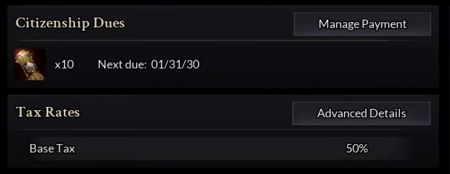Taxes
Taxes in Ashes of Creation refers to.
Node taxes

As the node levels up, you're gonna get access to deeper controls on the taxes, so that you as a Mayor can incentivize players to come to your node to do certain things. If you're a node that loves smithing, you're probably going to want to lower your taxes on artisanship to incentivize players to be here. But then you might want to drive up taxes on other avenues that players aren't necessarily coming to your node for, but are using out of convenience.[1] – Chris Justo
Mayors are able to set a generalized node tax rate as well as overrides for different activities within their node. Mayors gain additional taxation controls as their node advances.[1][2]
- Amenities tax override.[1]
- Artisanship tax override.[1]
- Commerce tax override.[1]
- This may include taxes that apply to tavern games.[3][4]
- Property tax override.[1]
- Freehold property taxes scale according to the number of freehold building permits issued for that freehold.[5][6][7]
- Citizenship dues and property taxes scale based on the stage of the node when a player became a citizen.[8][9][10][11][12]
- The goal is to exert financial pressure on node populations by making taxes increasingly expensive as nodes advance, rather than putting in place hard population caps.[10][11]
- Node tax rates will be visible on the world map by hovering over a node location.[13]
- Tax revenue only goes toward funding node development. This cannot be withdrawn by the mayor or any other player.[14][7]
Regent nodes take a cut of taxes from various activities that occur within their vassal node structure.[14][15]
- This tax doesn't necessarily impact the individual citizen, because citizen's tax levels are determined by their node, but the node's finances are affected by the taxation levied by its parent nodes.[15]
Housing taxes
When a node reaches stage 3 (Village) and a player run government has formed, all player housing will pay taxes.[16]
- A player's tax charge will be determined by the number of structures built on their plot.[6][7]
- Freehold taxes are calculated based on the number of permits issued for buildings on a freehold.[17][18][5][6][7]
- Buildings that require permits will have additional upkeep costs.[17]
- Maintaining businesses requires licensing and payments to the node your Freehold is associated with. This permitting system allows for a certain number of buildings to be constructed on a Freehold. Permits can be obtained from the same node the Freehold was certified from, and buildings that require permits will have an additional upkeep cost.[17]
- Housing foreclosures result from failing to pay property taxes or other fees.[17]
Housing foreclosures
Housing foreclosures result from failing to pay property taxes or other fees.[19][17]
- Non-payment of taxes will put the housing into a default status. The player will have a period of time to settle the debt before the housing is foreclosed.[19]
- The developers are considering allowing pre-payment of housing taxes and/or allowing auto deduction of tax from a designated location, such as their personal inventory or warehouse.[20]
- Materials and resources (such as livestock) that were stored on foreclosed freeholds will be included in the auction for the deed to that freehold. Stored and placed props, such as furniture will be returned to the previous owner.[17]
- If you don’t pay taxes and other fines, your Freehold property will be foreclosed. When a Freehold is foreclosed on, stored and placed props like furniture are returned to the previous owner. Materials that were stored on a Freehold will be included in the auction for the Deed to that Freehold.[17]
- Non-payment of the game subscription will also result in loss of player housing.[21]
Vassal nodes

This vassal mode structure tells you what it looks like for a sovereign at a level six metropolis stage; and what it can control at a maximum vassal network is two level five nodes, of which a level five node can control one level four and one level three as direct vassals; and then the four can control a three; and every three can control a one or a two. Now if the three gets removed through siege, the one or the two is removed as well. So that's an important distinction between the three's vassals, which technically isn't really a vassal relationship because there's no citizenships possible. Those vassals don't exist between three and X, but they do exist between four and three, five and four, and six and five. And what this also allows is that because there are 85 nodes that are within the world, we have a buffer zone of about 20 nodes that lives in a max server state. So if you had maximum five metropolises form in a world, you will have a number about 20 nodes that can live alongside those metropolis networks; and when or if a metropolis falls, that extra cushion of nodes around the five metropolis structures allows for the map to be redistricted in a way that is unique. It doesn't mean that one of the fives is just going to pick up where the last six left off and form the same exact metropolis structure. From a territory perspective it has ancillary nodes to play with and expand towards that redistricts the map, so that if a metropolis falls there's a significant difference in the layout of the world and the layout of these almost nation-like territories.[22] – Steven Sharif
Village (stage 3) or higher nodes enslave nearby nodes, converting them into vassal nodes.[23][24]
- A Metropolis (stage 6) can control up to two City (stage 5) nodes. A City (stage 5) can control one Town (stage 4) and one Village (stage 3) node. A Village (stage 3) can control an Encampment (stage 2) or an Expedition (stage 1). If the Village (stage 3) gets destroyed through a siege, its dependant Encampment (stage 2) and Expedition (stage 1) nodes are also destroyed.[22]
- There is a layer of intricacy between how the neighboring nodes advance and what potential parent structure they have in the vassalship tree.[25] – Steven Sharif
- Vassal nodes gain benefits from their regent node (also referred to as sovereign node or parent node) even if the node type of the parent is different to the vassal.[26][27]
- It is not a bad thing to be vasseled, it is a good thing to be vasseled. It brings many benefits from the Sovereign, which is the ultimate parent of that vassal network down to the vassal node itself; and it allows that vassal node to even live outside of its normal mechanics. You get to adopt some of the benefits that the node type of your sovereign is, even if your node type as a vassal node isn't the same.[27] – Steven Sharif
- Regent nodes collect taxes from their vassal nodes. These taxes cannot be taken by the mayor or other players.[14]
- Vassal nodes must remain at least one node stage below their parent node.[23]
- Neighboring/Adjacent nodes from Expedition (stage 1) upward block the growth of their immediate neighbors. This was intended to be tested in Alpha-1.[29][24]
- Vassal nodes first apply any experience earned to their own deficit (see Node atrophy). It then applies excess experience earned to its parent node.[30]
- If the parent node advances, the vassal is once again able to advance.[23]
- Vassal nodes give excess experience to their parent node and may have their own vassals; so long as they fall within the parent node’s zone of influence.[14][23]
- If a node is capped and is both a vassal and has its own vassals, any experience earned from itself or its Vassals is first applied to its own deficit. Experience beyond that is then sent to its parent node.[30]
- When the vassal reaches its cap it overflows experience up to the parent; and so it can be very good early on for parents to get vassal nodes that are very productive- that have a lot of traffic.[14] – Steven Sharif
- Vassals are subject to the government, alliances, wars, taxes, and trade of their parent node, and are able to receive federal aid from them.[23]
- Vassal nodes cannot declare war on their parent node or any of their vassals.[23]
- Citizens of vassals are bound by the diplomatic states of the parent node.[23]
- If a Node is a Vassal Node and is capped from advancing further, it first applies any experience earned to its own deficit (see Node Atrophy section), and then applies excess experience earned to its Parent Node. If the Parent Node advances and the Vassal is able to grow, it becomes uncapped. If a Node is capped and is both a Vassal and has its own Vassals, any experience earned from itself or its Vassals is first applied to their own deficit. Any experience beyond that is then sent to its Parent Node.[30] – Margaret Krohn
Castle taxes

Castles have direct power over the Nodes that belong to it, but also have soft power across the entire region it belongs to. All Nodes belonging to that region pay fealty to the Castle in the form of taxes paid directly to the Castle. The Monarch sets the rate, and can use those proceeds to upgrade defenses, maintain the Castle’s direct Nodes, or provide buffs and benefits to the citizens of that region, as the magnanimous ruler that you are.[31]
Guild castles impose a tax on all revenue for the nodes within its region.[32][33]
- The monarch sets the tax rate, and can use those proceeds to upgrade defenses, maintain the castle's direct nodes, or provide buffs and benefits to the citizens of that region.[31]
- Castle taxes are carried via NPC generated caravans from the nodes that fall under the castle's purview to one of the castle nodes at the end of each week leading up to a castle siege.[34]
- In addition to taxes, Castles also influence crop yields, resources and events within its region.[35]
- Part of the tax and resources gathered are applied to the castle for improvements.[32][36][37]
- The remainder of tax income can be used by the guild for whatever they want.[32][38]
- When castles change hands (following a siege), some taxes stay with the castle and some stay with the guild.[39]
- Castles have the ability to allocate taxes collected from nodes under them toward certain benefits that go back to the node. Or they can be more selfishly governed that treasury more towards the guild that owns it and that obviously is going to have some political implications, because it could- if you're not using it for the benefit of the people in the region they might rise up and help take you out from that that position of owning that castle.[32] – Steven Sharif
Companion app
A companion app (mobile app/web interface) allows players who are not logged into the game to have authority over certain services and mechanics.[40][41] Some functionality may come post-launch.[42]
- Crop rotations.[41][42][43]
- Player stalls (Kiosks).[42]
- Mayoral duties.[42][44]
- Pay taxes.[42]
- Fishing (potentially).[42]
- Parlor games (Tavern games).[42][45]
- World event notifications.[42]
- Node citizenship notifications.[42]
- Player housing notifications.[42]
- Guild leadership tools such as calendar notifications is a possible feature.[46]
- Specific dates that you can have running as reminders in your guild UI, this will also be something that I would like to be available on the mobile companion app as well. So essentially you can receive notifications via a calendar update on guild events that the leaders or the officers have the ability to pin within the game will also give you notifications on the mobile app as well. That's my intention at least.[46] – Steven Sharif
- Some of it may come post-launch... but we do want people to interact with the game on their phones when they're away from the computer; and we're going to do as much as we can to make that cool.[42] – Jeffrey Bard
See also
References
- ↑ 1.0 1.1 1.2 1.3 1.4 1.5 1.6 1.7 Video, August 31, 2023 (28:04).
- ↑ Livestream, March 28, 2020 (1:03:38).
- ↑

- ↑

- ↑ 5.0 5.1 Interview, July 9, 2023 (54:46).
- ↑ 6.0 6.1 6.2 Livestream, June 30, 2023 (1:45:22).
- ↑ 7.0 7.1 7.2 7.3

- ↑ Blog: Development Update with Village Node.
- ↑ Livestream, August 31, 2023 (15:51).
- ↑ 10.0 10.1 Interview, July 9, 2023 (38:14).
- ↑ 11.0 11.1 Interview, March 27, 2020 (0:30).
- ↑ Video, April 5, 2018 (41:48).
- ↑ Livestream, September 29, 2023 (1:11:22).
- ↑ 14.0 14.1 14.2 14.3 14.4 Livestream, August 26, 2022 (1:10:16).
- ↑ 15.0 15.1 Interview, May 11, 2018 (57:02).
- ↑

- ↑ 17.0 17.1 17.2 17.3 17.4 17.5 17.6 Blog: Exploring the Boundless Opportunities of Freeholds.
- ↑

- ↑ 19.0 19.1 Livestream, August 31, 2023 (24:13).
- ↑ Livestream, July 28, 2023 (1:29:07).
- ↑ Livestream, May 24, 2017 (42:22).
- ↑ 22.0 22.1 22.2 Livestream, August 26, 2022 (1:07:34).
- ↑ 23.0 23.1 23.2 23.3 23.4 23.5 23.6 Blog - Know Your Nodes - The Basics.
- ↑ 24.0 24.1

- ↑

- ↑ Livestream, August 31, 2023 (52:56).
- ↑ 27.0 27.1 Livestream, August 26, 2022 (1:04:35).
- ↑

- ↑

- ↑ 30.0 30.1 30.2 Blog - Know Your Nodes - Advance and Destroy.
- ↑ 31.0 31.1 Blog: 10 facts about castle sieges in the MMORPG.
- ↑ 32.0 32.1 32.2 32.3 Livestream, April 30, 2021 (1:01:10).
- ↑

- ↑ Livestream, August 28, 2020 (1:39:02).
- ↑

- ↑

- ↑

- ↑

- ↑

- ↑ Livestream, January 18, 2018 (30:18).
- ↑ 41.0 41.1 Livestream, November 17, 2017 (11:00).
- ↑ 42.00 42.01 42.02 42.03 42.04 42.05 42.06 42.07 42.08 42.09 42.10 Livestream, May 4, 2018 (54:09).
- ↑ Livestream, May 9, 2017 (28:57).
- ↑ Livestream, November 17, 2017 (9:49).
- ↑ Livestream, November 17, 2017 (11:53).
- ↑ 46.0 46.1 Podcast, November 15, 2020 (52:50).

